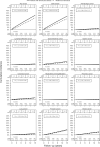Cancer risk in patients with diverticular disease: A nationwide cohort study
- PMID: 36200887
- PMCID: PMC9830486
- DOI: 10.1093/jnci/djac190
Cancer risk in patients with diverticular disease: A nationwide cohort study
Abstract
Background: There are little data on diverticular disease and cancer development other than colorectal cancer.
Methods: We conducted a population-based, matched cohort study with linkage of nationwide registers to the Epidemiology Strengthened by histoPathology Reports in Sweden histopathology cohort. We included 75 704 patients with a diagnosis of diverticular disease and colorectal histopathology and 313 480 reference individuals from the general population matched on age, sex, calendar year, and county. Cox proportional hazards models estimated multivariable-adjusted hazard ratios (HRs) for associations between diverticular disease and overall cancer and specific cancers.
Results: Over a median follow-up of 6 years, we documented 12 846 incident cancers among patients with diverticular disease and 43 354 incident cancers among reference individuals from the general population. Compared with reference individuals, patients with diverticular disease had statistically significantly increased overall cancer incidence (24.5 vs 18.1 per 1000 person-years), equivalent to 1 extra cancer case in 16 individuals with diverticular disease followed-up for 10 years. After adjusting for covariates, having a diagnosis of diverticular disease was associated with a 33% increased risk of overall cancer (95% confidence interval [CI] = 1.31 to 1.36). The risk increases also persisted compared with siblings as secondary comparators (HR = 1.26, 95% CI = 1.21 to 1.32). Patients with diverticular disease also had an increased risk of specific cancers, including colon cancer (HR = 1.71, 95% CI = 1.60 to 1.82), liver cancer (HR = 1.72, 95% CI = 1.41 to 2.10), pancreatic cancer (HR = 1.62, 95% CI = 1.42 to 1.84), and lung cancer (HR = 1.50, 95% CI = 1.39 to 1.61). The increase in colorectal cancer risk was primarily restricted to the first year of follow-up, and especially early cancer stages.
Conclusions: Patients with diverticular disease who have colorectal histopathology have an increased risk of overall incident cancer.
© The Author(s) 2022. Published by Oxford University Press. All rights reserved. For permissions, please email: journals.permissions@oup.com.
Figures


Comment in
-
Diverticular disease and cancer risk: More than a gut feeling.J Natl Cancer Inst. 2023 Jan 10;115(1):12-13. doi: 10.1093/jnci/djac191. J Natl Cancer Inst. 2023. PMID: 36200895 Free PMC article. No abstract available.
Similar articles
-
Mortality risk increased in colonic diverticular disease: a nationwide cohort study.Ann Epidemiol. 2022 Dec;76:39-49. doi: 10.1016/j.annepidem.2022.10.006. Epub 2022 Oct 15. Ann Epidemiol. 2022. PMID: 36252891
-
Colorectal cancer in Crohn's disease: a Scandinavian population-based cohort study.Lancet Gastroenterol Hepatol. 2020 May;5(5):475-484. doi: 10.1016/S2468-1253(20)30005-4. Epub 2020 Feb 14. Lancet Gastroenterol Hepatol. 2020. PMID: 32066530
-
Risk of a post-colonoscopy colorectal cancer in patients with diverticular disease: a population-based cohort study.Endoscopy. 2024 Jul;56(7):471-481. doi: 10.1055/a-2264-8199. Epub 2024 Feb 8. Endoscopy. 2024. PMID: 38331045
-
Risk of colorectal cancer incidence and mortality after polypectomy: a Swedish record-linkage study.Lancet Gastroenterol Hepatol. 2020 Jun;5(6):537-547. doi: 10.1016/S2468-1253(20)30009-1. Epub 2020 Mar 17. Lancet Gastroenterol Hepatol. 2020. PMID: 32192628 Free PMC article.
-
Colorectal cancer in ulcerative colitis: a Scandinavian population-based cohort study.Lancet. 2020 Jan 11;395(10218):123-131. doi: 10.1016/S0140-6736(19)32545-0. Lancet. 2020. PMID: 31929014
Cited by
-
Association between diverticular disease and colorectal cancer: a bidirectional mendelian randomization study.BMC Cancer. 2023 Feb 10;23(1):137. doi: 10.1186/s12885-023-10606-x. BMC Cancer. 2023. PMID: 36765336 Free PMC article.
-
Follow-Up Colonoscopy for Detection of Missed Colorectal Cancer After Diverticulitis.Clin Gastroenterol Hepatol. 2024 Oct;22(10):2125-2133. doi: 10.1016/j.cgh.2024.03.036. Epub 2024 Apr 25. Clin Gastroenterol Hepatol. 2024. PMID: 38670477
-
Diverticulosis and neoplastic lesions in screening colonoscopy: a large, multicenter study.Ann Gastroenterol. 2025 Jan-Feb;38(1):68-71. doi: 10.20524/aog.2024.0928. Epub 2024 Dec 12. Ann Gastroenterol. 2025. PMID: 39802296 Free PMC article.
-
Diverticular disease and cancer risk: More than a gut feeling.J Natl Cancer Inst. 2023 Jan 10;115(1):12-13. doi: 10.1093/jnci/djac191. J Natl Cancer Inst. 2023. PMID: 36200895 Free PMC article. No abstract available.
References
Publication types
MeSH terms
Grants and funding
LinkOut - more resources
Full Text Sources
Medical

